专四听力之DICTATION
- 格式:ppt
- 大小:560.00 KB
- 文档页数:40
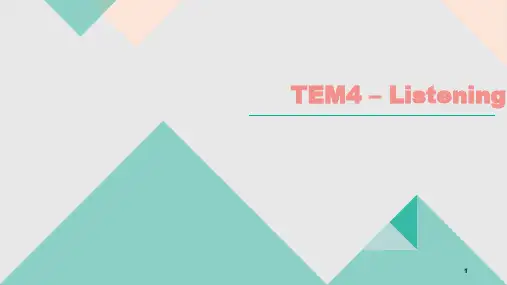
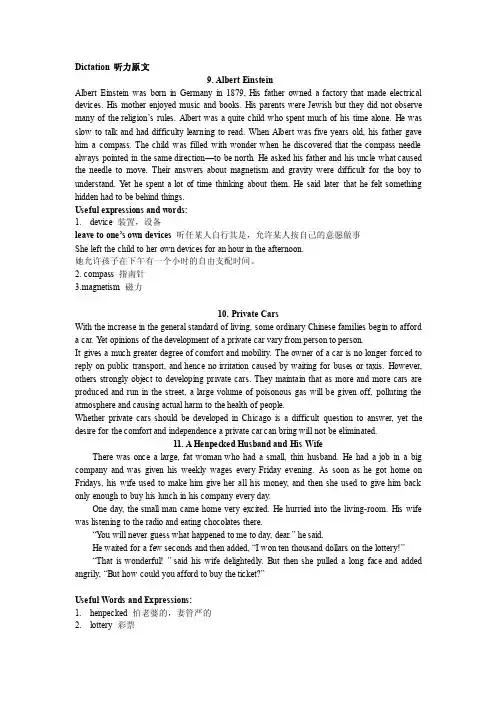
Dictation 听力原文9. Albert EinsteinAlbert Einstein was born in Germany in 1879, His father owned a factory that made electrical devices. His mother enjoyed music and books. His parents were Jewish but they did not observe many of the religion’s rules. Albert was a quite child who spent much of his time alone. He was slow to talk and had difficulty learning to read. When Albert was five years old, his father gave him a compass. The child was filled with wonder when he discovered that the compass needle always pointed in the same direction—to be north. He asked his father and his uncle what caused the needle to move. Their answers about magnetism and gravity were difficult for the boy to understand. Y et he spent a lot of time thinking about them. He said later that he felt something hidden had to be behind things.Useful expressions and words:1.device 装置,设备leave to one’s own devices 听任某人自行其是,允许某人按自己的意愿做事She left the child to her own devices for an hour in the afternoon.她允许孩子在下午有一个小时的自由支配时间。
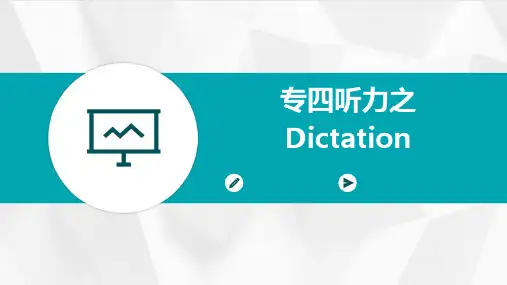
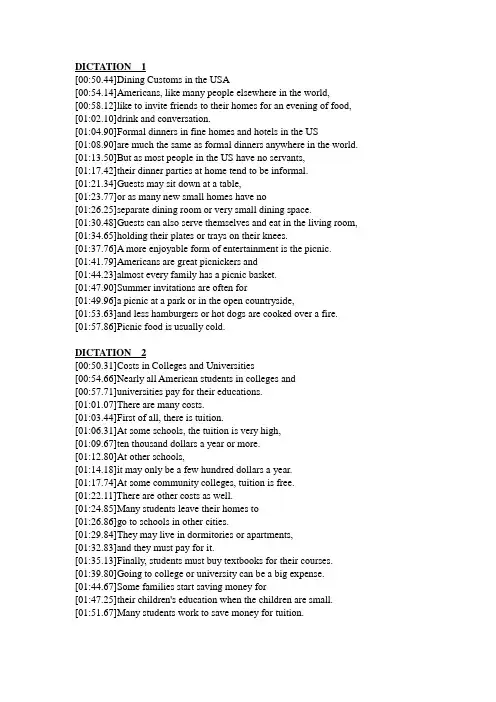
DICTATION 1[00:50.44]Dining Customs in the USA[00:54.14]Americans, like many people elsewhere in the world, [00:58.12]like to invite friends to their homes for an evening of food, [01:02.10]drink and conversation.[01:04.90]Formal dinners in fine homes and hotels in the US[01:08.90]are much the same as formal dinners anywhere in the world. [01:13.50]But as most people in the US have no servants,[01:17.42]their dinner parties at home tend to be informal.[01:21.34]Guests may sit down at a table,[01:23.77]or as many new small homes have no[01:26.25]separate dining room or very small dining space.[01:30.48]Guests can also serve themselves and eat in the living room, [01:34.65]holding their plates or trays on their knees.[01:37.76]A more enjoyable form of entertainment is the picnic. [01:41.79]Americans are great picnickers and[01:44.23]almost every family has a picnic basket.[01:47.90]Summer invitations are often for[01:49.96]a picnic at a park or in the open countryside,[01:53.63]and less hamburgers or hot dogs are cooked over a fire. [01:57.86]Picnic food is usually cold.DICTATION 2[00:50.31]Costs in Colleges and Universities[00:54.66]Nearly all American students in colleges and[00:57.71]universities pay for their educations.[01:01.07]There are many costs.[01:03.44]First of all, there is tuition.[01:06.31]At some schools, the tuition is very high,[01:09.67]ten thousand dollars a year or more.[01:12.80]At other schools,[01:14.18]it may only be a few hundred dollars a year.[01:17.74]At some community colleges, tuition is free.[01:22.11]There are other costs as well.[01:24.85]Many students leave their homes to[01:26.86]go to schools in other cities.[01:29.84]They may live in dormitories or apartments,[01:32.83]and they must pay for it.[01:35.13]Finally, students must buy textbooks for their courses. [01:39.80]Going to college or university can be a big expense. [01:44.67]Some families start saving money for[01:47.25]their children's education when the children are small. [01:51.67]Many students work to save money for tuition.[01:55.71]They can also get loans from the government.[01:58.95]They pay the money back to the government[02:01.12]when they finish their education.DICTATION 4[00:49.96]Rainbow[00:51.51]You will not always see a rainbow[00:53.63]when it rains while the sun shines.[00:56.62]The sun must be in the right position over the horizon. [01:00.72]And remember to turn your back to the sun[01:03.85]when you look toward the sky.[01:05.90]A rainbow will never appear[01:07.92]in the path between you and the sun.[01:10.91]If you are on the ground,[01:13.08]you will only see a part of the rainbow.[01:16.27]This is because the earth blocks the rest of the circle. [01:20.07]You can see the whole circle[01:21.94]if you are flying high in a plane when a rainbow happens. [01:26.43]The shadow of the plane would be in the center.[01:30.22]Rainbows hold an important place[01:32.85]in the traditional stories and beliefs[01:35.75]that make up many cultures.[01:37.94]For example, some cultures say the rainbow[01:40.74]represents a bridge between life and death.[01:44.28]Still others see the rainbow as a sign of good things to come.PART I DICTATION text 1[01:02.23]Plastic[01:03.41]We use plastic wrap to protect our foods.[01:06.40]We put our garbage in plastic bags or plastic cans.[01:10.55]We sit on plastic chairs, play with plastic toys,[01:14.30]drink from plastic cups,[01:16.43]and wash our hair with shampoo from plastic bottles.[01:20.62]Plastic does not grow in nature.[01:23.51]It is made by mixing certain things together.[01:27.01]We call it a produced or manufactured material.[01:31.52]Plastic was first made in the 1860s from plants,[01:35.41]such as wood and cotton.[01:37.72]That plastic was soft and burned easily.[01:41.55]The first modern plastics were made in the 1930s.[01:46.00] Most clear plastic starts out as thick, black oil.[01:50.93]That plastic coating inside a pan begins as natural gas.[01:56.53]Over the years,[01:57.79]hundreds of different plastics have been developed.[02:01.15]Some are hard and strong. Some are soft and bendable. [02:05.91]Some are clear. Some are many-colored.[02:09.90]There is a plastic for almost every need.[02:13.79]Scientists continue to experiment with plastics.[02:17.73]They hope to find even more ways to use them.PART II LISTENING COMPREHENSION1-10 C A D C A C B C B C11-20 A D D D B B B C B D21-30 C B C C C D D C C D[00:16.16]PART I DICTATION text 2[01:01.98]Music[01:02.85]Music is the abstract art of arranging vocal or[01:06.28]instrumental sounds[01:07.62]in a manner that produces a flowing,[01:10.08]unified and thoughtful composition that has melody,[01:14.32]harmony, rhythm.[01:16.25]In contrast to the other arts,[01:18.43]music is not a readily tangible form of expression.[01:22.86]Music may be called both the most mathematical and [01:26.36]the most abstract of the arts.[01:29.30]Unlike words, images, or dance, however,[01:32.82]musical tones in themselves have no concrete associations, [01:37.55]and only gain meaning when they are combined into patterns. [01:42.04]Through the centuries various philosophers have[01:44.79]attempted to integrate theories[01:46.78]on the essence of music with their particular world views. [01:50.92]Many non-Western cultures and some Western writers [01:54.53]as well have perceived it as an inherently mystical force, [01:58.85]able to unlock elemental truths or principles[02:02.27]that cannot be translated into written or graphic form. [02:06.83]Music is an important part of our lives,[02:09.44]and has been an important part of[02:11.50]every civilization known to man.PART II LISTENING COMPREHENSION1-10 A D C C B C D B A D11-20 C C A B A A C C B A21-30 D C D D C D B D A C。
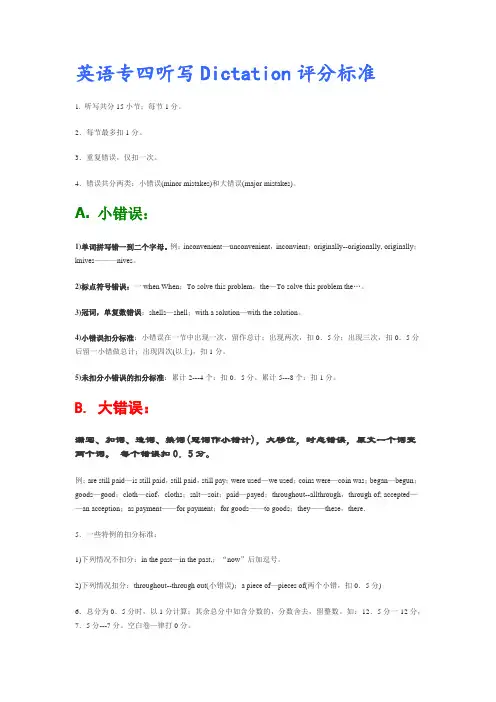
英语专四听写Dictation评分标准1. 听写共分15小节;每节1分。
2.每节最多扣1分。
3.重复错误,仅扣一次。
4.错误共分两类:小错误(minor mistakes)和大错误(major mistakes)。
A. 小错误:1)单词拼写错一到二个字母。
例:inconvenient—unconvenient,inconvient;originally--origionally, originally;knives———nives。
2)标点符号错误:一when When;To solve this problem,the—To solve this problem the…。
3)冠词,单复数错误:shells—shell;with a solution—with the solution。
4)小错误扣分标准:小错误在一节中出现一次,留作总计;出现两次,扣0.5分;出现三次,扣0.5分后留一小错做总计;出现四次(以上),扣1分。
5)未扣分小错误的扣分标准:累计2---4个:扣0.5分。
累计5---8个:扣1分。
B. 大错误:漏写、加词、造词、换词(冠词作小错计),大移位,时态错误,原文一个词变两个词。
每个错误扣0.5分。
例:are still paid—is still paid,still paid,still pay;were used—we used;coins were—coin was;began—begun;goods—good;cloth—ciof,cloths;salt—soit;paid—payed;throughout--allthrough,through of; accepted——an acception;as payment——for payment;for goods——to goods;they——these,there.5.一些特例的扣分标准:1)下列情况不扣分:in the past—in the past,;“now”后加逗号。
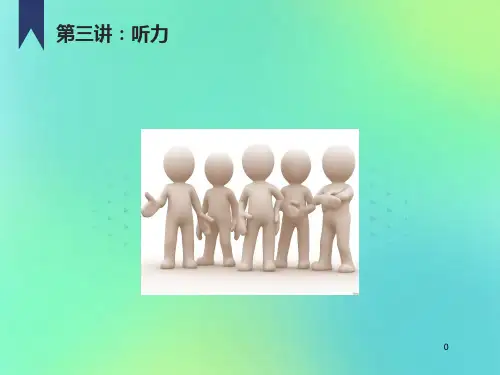
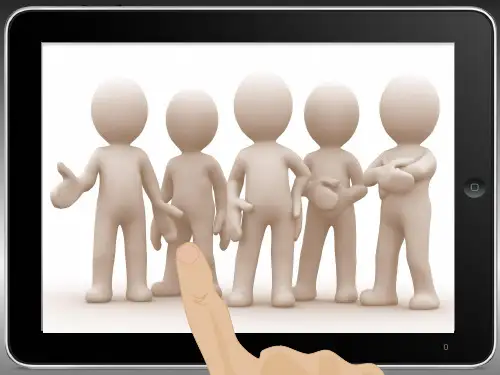
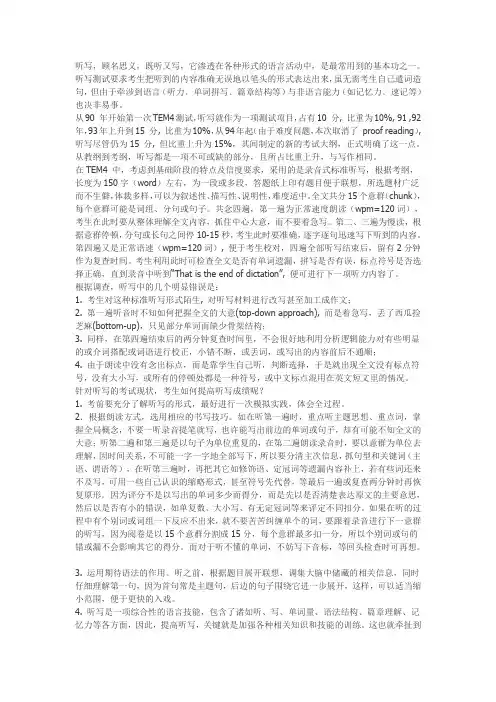
听写,顾名思义,既听又写,它渗透在各种形式的语言活动中,是最常用到的基本功之一。
听写测试要求考生把听到的内容准确无误地以笔头的形式表达出来,虽无需考生自己遣词造句,但由于牵涉到语言(听力﹑单词拼写﹑篇章结构等)与非语言能力(如记忆力﹑速记等)也决非易事。
从90 年开始第一次TEM4测试,听写就作为一项测试项目,占有10 分, 比重为10%, 91 ,92年,93年上升到15 分, 比重为10%,从94年起(由于难度问题,本次取消了proof reading), 听写尽管仍为15 分, 但比重上升为15%,其间制定的新的考试大纲,正式明确了这一点。
从教纲到考纲,听写都是一项不可或缺的部分,且所占比重上升,与写作相同。
在TEM4 中,考虑到基础阶段的特点及信度要求,采用的是录音式标准听写,根据考纲,长度为150字(word)左右,为一段或多段,答题纸上印有题目便于联想,所选题材广泛而不生僻,体裁多样,可以为叙述性、描写性、说明性,难度适中。
全文共分15个意群(chunk),每个意群可能是词组、分句或句子。
共念四遍,第一遍为正常速度朗读(wpm=120词),考生在此时要从整体理解全文内容,抓住中心大意,而不要着急写。
第二、三遍为慢读,根据意群停顿,分句或长句之间停10-15秒,考生此时要准确,逐字逐句迅速写下听到的内容。
第四遍又是正常语速(wpm=120词), 便于考生校对,四遍全部听写结束后,留有2分钟作为复查时间。
考生利用此时可检查全文是否有单词遗漏,拼写是否有误,标点符号是否选择正确,直到录音中听到“That is the end of dictation”, 便可进行下一项听力内容了。
根据调查,听写中的几个明显错误是:1. 考生对这种标准听写形式陌生, 对听写材料进行改写甚至加工成作文;2. 第一遍听音时不知如何把握全文的大意(top-down approach), 而是着急写,丢了西瓜捡芝麻(bottom-up),只见部分单词而缺少骨架结构;3. 同样,在第四遍结束后的两分钟复查时间里,不会很好地利用分析逻辑能力对有些明显的或介词搭配或词语进行校正,小错不断,或丢词,或写出的内容前后不通顺;4. 由于朗读中没有念出标点,而是靠学生自己听,判断选择,于是就出现全文没有标点符号,没有大小写,或所有的停顿处都是一种符号,或中文标点混用在英文短文里的情况。
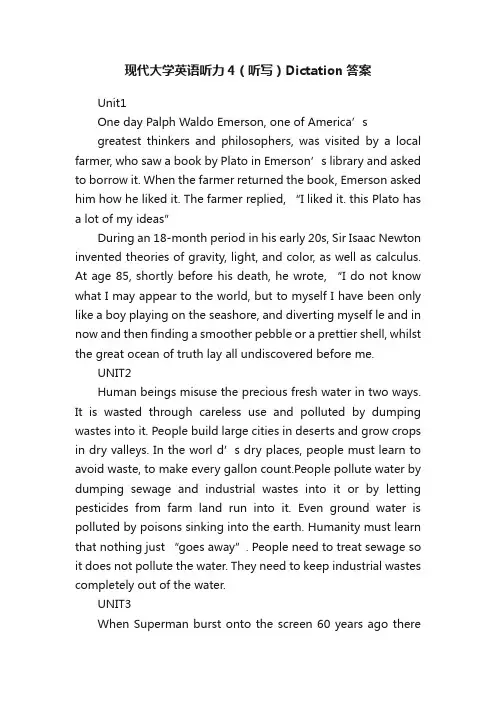
现代大学英语听力4(听写)Dictation答案Unit1One day Palph Waldo Emerson, one of America’sgreatest thinkers and philosophers, was visited by a local farmer, who saw a book by Plato in Emerson’s library and asked to borrow it. When the farmer returned the book, Emerson asked him how he liked it. The farmer replied, “I liked it. this Plato has a lot of my ideas”During an 18-month period in his early 20s, Sir Isaac Newton invented theories of gravity, light, and color, as well as calculus. At age 85, shortly before his death, he wrote, “I do not know what I may appear to the world, but to myself I have been only like a boy playing on the seashore, and diverting myself le and in now and then finding a smoother pebble or a prettier shell, whilst the great ocean of truth lay all undiscovered before me.UNIT2Human beings misuse the precious fresh water in two ways. It is wasted through careless use and polluted by dumping wastes into it. People build large cities in deserts and grow crops in dry valleys. In the worl d’s dry places, people must learn to avoid waste, to make every gallon count.People pollute water by dumping sewage and industrial wastes into it or by letting pesticides from farm land run into it. Even ground water is polluted by poisons sinking into the earth. Humanity must learn that nothing just “goes away”. People need to treat sewage so it does not pollute the water. They need to keep industrial wastes completely out of the water.UNIT3When Superman burst onto the screen 60 years ago therehad never been a character quite like him, and he remains unique today. The innumerable imitators who followed in his wake have acknowledged his primacy by taking on the title of super hero, but Superman did more than start the trend that came to define the American comic book. His influence spread throughout all known media as he became a star of animated cartoons, radio, recordings, books, motion pictures, and television, whil his image appeared on products ranging from puzzles to peanut butter. He is perhaps the first fictional character to have been so successfully promoted as a universal icon, yet he also continues to remain a publishing phenomenon whose adventures appear in no fewer than five monthly comics magazines.UNIT4The Chinese have long believed that flexible brush is the perfect means to express one’s inner spirit. Thus calligraphy with ink on paper or silk, whether by scholars, poets, monks, or government officials, is often considered the highest form of art. Great masterworks from earlier periods such as the Tang Dynasty were used as modals for the proper style and the proportion of the more than 50,000 Chinese characters. There were also a number of different scripts to choose from. Ancient seal script, used even today for carving seals, conveys an archaic flavor, as does clerical script, developed in the Han Dynasty by clerks to record government documents. Calligraphy, however, could also be written in regular, running, or cursive script, not unlike our own choices in English-for example, most of us do not write the small letter a in the printed form, but in more rapid pencil or pen movement. Similarly, Chinese calligraphers usually preferred less formal and more dramatic styles of brushwork to regular script. Some masters, however, combined scripts, such as thepainter-poet-calligrapher Zheng Xie, who enjoyed mixing clerical, regular, running, and the cursive scripts.UNIT52002 was the first year when china became a full WTO member, and also a year when the insurance industry in china grew the fastest, with a revenue of 305.3 billion yuan, up by 44.7 percent over the previous year, and total assets of 649.41 billion yuan, up by 41.4 percent. The insurance industry was still small in scale, constituting 2.98percent of GDP, and a low share in the national economy, much lower than that of banking and securities trading. However, demand for insurance services was sharply up. Moreover, after China’s accession to WTO, foreign insurance companies quickly flooded into China’s insurance market, China’s insurance companies also stepped up their efforts to join hands with foreign business.UNIT6Looking at Moscow’s booming shopping malls or elite supermarkets, it’s easy to think there isn’t that much wrong with the Russian economy. But there’s a growing warning of serious imbalances. Household spending is continuing to grow strongly, part of a consumer-driven boom and a burgeoning personal credit sector. But elsewhere, the outlook isn’t so good. There is pressure to stop using the country’s glut of oil dollars to pay off national debt, but to invest it-in areas like hi-tech industry, infrastructure and housing reform. Russian produces very few internationally marketable consumer goods. And even former flagship industries like civilian aircraft construction, are close to extinction. Foreign businesses may also be concerned by a new draft bill the Russian government has presented to the country’s parliament. The bill, if adopted, would seriously limitforeign ers’rights to develop Russian oil and metal deposits, describing them as vital strategic national interests.UNIT7The US flag is an important symbol to all Americans. During the revolution against Britain, George Washington asked Betsy Ross to make a flag as an encouragement for his soldiers. This flag had 13 stripes, seven red and six white, and in one corner 13 white stars on the blue background to represent the 13 states. On 14 June, 1777, it became the flag of independent US. As each new state became part of the US, an extra star was added.Today, the flag, called Old Glory or the Stars and Stripes, is widely seen in the US. Government offices and schools have flags flying from flagpoles, and many people have flags outside their houses, especially on Independent Day. Children start the school day by saying the Pledge of Allegiance, a promise to be loyal to the flag and to their country. When somebody important dies, flags are flown at half mast. When a soldier dies, his or her coffin is covered with a flag, and after the funeral, the flag is given to the family. The flag has also been used as a symbol of protest, especially during the Vietnam War, when some people burnt the flag to show that they were ashamed of their country’s actions.Each of the US states also has its own flag. States flags may show the state flower or bird, or other emblem.UNIT8Legend has it that should the ravens ever leave the Tower of London the White Tower will crumble and a great disaster shall befall England. For many centuries ravens have been known to be residents of the Tower of London and are now an integral feature protected by royal decree. It is not clear at what point in history the ravens became accepted occupants of the Tower ofLondon but a strange point of fact is that the only recorded time that were no ravens at the Tower was in1946. As this was just after World War Ⅱand England had come perilously close to falling, maybe the legend carries some weight after all.。
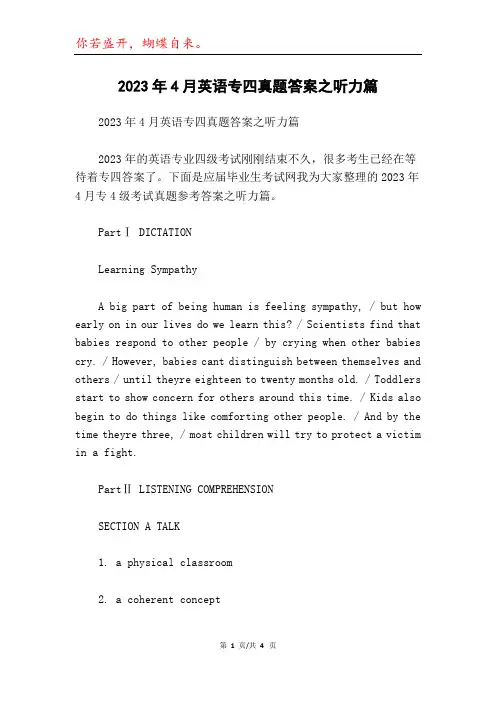
2023年4月英语专四真题答案之听力篇2023年4月英语专四真题答案之听力篇2023年的英语专业四级考试刚刚结束不久,很多考生已经在等待着专四答案了。
下面是应届毕业生考试网我为大家整理的2023年4月专4级考试真题参考答案之听力篇。
PartⅠ DICTATIONLearning SympathyA big part of being human is feeling sympathy, / but how early on in our lives do we learn this? / Scientists find that babies respond to other people / by crying when other babies cry. / However, babies cant distinguish between themselves and others / until theyre eighteen to twenty months old. / Toddlers start to show concern for others around this time. / Kids also begin to do things like comforting other people. / And by the time theyre three, / most children will try to protect a victim in a fight.PartⅡ LISTENING COMPREHENSIONSECTION A TALK1. a physical classroom2. a coherent concept3. personalized curriculum4. (more) meaningful practice5. feedback6. collaborating7. question and answer8. fundamental human right9. lifelong learning10. innovationSECTION B CONVERSATIONS1. Whats wrong with the mans computer?答案:A. It has wiped the data from the flash drive.2. How will the man be compensated if the computer cant be fixed?答案:C. Get a new computer.3. How did the man feel about the womans offer of compensation?答案:D. Dissatisfied.4. When will the service engineer come to fix the computer?答案:B. After 8:30 tomorrow morning.5. What is the mans phone number?答案:A. 6574-3205.6. What should we do if our neighbors didnt reach out?答案:B. Introduce ourselves first.7. Which is the best way to handle a noisy neighbor?答案:C. Give him a reason to stop.8. What should we do if we have a nosy neighbor?答案:D. Dont answer their questions.9. How long do we expect our neighbors to stay?答案:B. Five to ten minutes.10. Where can we get more information on this topic?答案:D. CBS news website.文档内容到此结束,欢迎大家下载、修改、丰富并分享给更多有需要的人。

New Year’s Eve•For many people in the west, New Year’s Eve is the biggest party of the year. It’s time to get together with friends or family and welcome in the coming year. New Year’s parties can take place in different places. Some people hold a house party; others attendstreet parties, while some just go for a few drinks with their friends.Big cities have large and spectacular fireworks displays. There is one thing that all New Year’s Eve parties have in common, the countdown to midnight. When the clock strikes 12, people give a loud cheer and sing songs. It’s also popular to make a promise in the New Year. This is called a New Year’s resolution. Typicalresolutions include giving up smoking and keeping fit. However the promise is often broken quite quickly and people are back into their bad habits within weeks or days.Town and Country Life in England •There is a big difference between town life and country life in England. In the country, everybody knowseverybody else. They know what time you get up, what time you go to bed and what you have for dinner. If you want help, you will always get it and you will be glad to help others. In a large town like London, however, it can sometimes happen that you have never seen your next door neighbor and you do not know his name or anything about him. People in London are often very lonely. This is because people go to different places in the evenings and at weekends. If you walk through the streets in the center of London on Sunday, it is like a town withoutpeople. One is sorry for old people living on their own.They could die in their homes and would not bediscovered for weeks or even months.A Change in Women’s Life•The important change in women’s life-pattern has only recently begun to have its full effect on women’s economic position. Even a few years ago most girls left school at the first opportunity, and most of them took a full-time job. However, when they married, theyusually left work at once and never returned to it. Today the school-leaving age is sixteen, many girls stay at school after that age, and though women tend to marry younger, more married women stay at work at least until shortly before their first child is born. Very many more afterwards return to full-time or part-time work. Such changes have led to a new relationship in marriage, with the husbandaccepting a greater share of the duties and satisfactions of family life and with both husband and wife sharing more equally in providing the money, and running the home, according to the abilities andinterests of each of them.A Popular Pastime of the English People •One of the best means of understanding the people of any nation is watching what the do with their non-working time.Most English men, women and children love growing things, especially flowers. Visitors to England in spring, summer or autumn are likely to see gardens all they way along the railway lines. There are flowers at the airports and flowers in factory grounds, as well as in gardens along theroads. Each English town has at least one park with beautifully kept flower beds. Public buildings of every kind have brilliant windowboxes and sometimes baskets of flowers are hanging on them.But what the English enjoy most is growing things themselves. If it is impossible to have a garden, then a window box or somethinggrowing in a pot will do. Looking at each other’s gardens is apopular pastime with the English.Useful Words and Expressions:• 1. window box:窗台上的花盆箱• 2.pastime 消遣,娱乐•Swimming is my favorite pastime.British and American Police Officers •Real policemen, both in Britain and the U.S., hardly recognize any common points between their lives and what they se on TV—if they ever get home in time.Some things are almost the same, of course, but the policemen do not think much of them much of them.The first difference is that a policeman’s real life deals with the law. Most of what he learns is the law. He has to know actually what actions are against the law and what facts can be used to prove them in court.He has to know nearly as much law as a lawyer, and what’s more, he has to put it into practice on his feet, in the dark and, runningdown a narrow street after someone he wants to talk to.Little of his time is spent in talking with beautiful girls or in bravely facing cruel criminals. He will spend most of his working life arranging millions of words on thousands of forms about hundreds of sad, ordinarypeople who are guilty---or not of stupid, unimportant crimes.Useful Words and Expressions:• 1. think much of 重视,尊重• 2. in court 在法庭上• 3. criminal 罪犯,犯罪者• 4. guilty 犯罪的,有罪的Living Space•How much living space does a person need? What happens when his space needs are not met? Scientists are doing experiments on rats to try to determine the effects of overcrowded conditions on man. Recentstudies have shown that the behavior of rats is greatly affected by space.If rats have enough living space, they eat well, sleep well and produce their young well. But if their living conditions become too crowded, their behavior and even their health change obviously. They can not sleep and eat well, and signs of fear and worry become clear. The more crowded they are, and more they tend to bite each other and even kill each other.Thus, for rats, populations and violence are directly related. Is this anatural law for human society as well? Is enough space not onlysatisfactory, but necessary for human survival? These are interesting questions.The United Nations•In 1945, representatives of 50 nations met to plan this organization.It was called the United Nations. After the war, many more nations joined.There are two major parts of the United Nations. One is called the General Assembly. In the General Assembly, every membernation is represented and has an equal vote.The second part iscalled the Security Council. It has representatives of just 15 nations.Five nations are permanent members: the United States, Russia, France, Britain, and China. The 10 other members are elected every two years by the General Assembly.The major job of the Security Council is to keep peace in the world. If necessary, it can sendtroops from member nations to try to stop little wars before they turn into big ones.It is hard to get the nations of the Security Council to agree on when this is necessary. But they did vote to try to stopwars.Useful Words and Expressions:• 1. representative 代表• 2. General Assembly 联合国大会• 3. permanent 永久的,持久的• 4. Security Council 联合国安全理事会Plastic•We use plastic wrap to protect our foods. We put our garbage in plastic bags or plastic cans. We sit on plastic chairs, play with plastic toys, drink from plastic cups, and wash our hair with shampoo from plastic bottles!Plastic does not grow in nature. It is made by mixing certain things together. We call it a produced or manufacturedmaterial. Plastic was first made in the 1860s from plants, such as wood and cotton. That plastic was soft and burned easily.The first modern plastics were made in the 1930s. Most clear plastic starts out as thick, black oil. That plastic coating inside a pan begins as natural gas.Over the years, hundreds of different plastics have been developed. Some are hard and strong. Some are soft and bendable.Some are clear. Some are many-colored. There is a plastic foralmost every need. Scientists continue to experiment with plastics.They hope to find even ways to use them!Display of Goods•Are supermarkets designed to persuade us to buy more?Fresh fruit and vegetables are displayed near supermarket entrances. This gives the impression that only healthy food is sold in the shop. Basic foods that everyone buys, like sugar and tea, are not put near each other.They are kept in different aisles so customers are taken past other attractive foods before they find what they want. In this way, shoppers are encouraged to buy products that they do not really need.Sweets are often placed at children’s eye level at the checkout. Whileparents are waiting to pay, children reach for the sweets and put them in the trolley.More is bought from a fifteen-foot display of one type of product than from a ten-foot one. Customers also buy more whenshelves are full than when they are half empty. They do not like to buy from shelves with few products on them because they feel there is something wrong with those products that are there.Useful Words and Expressions:• 1. aisle 走廊,过道• 2. trolley 手推车• 3. checkout 收款台Albert Einstein•Albert Einstein was born in Germany in 1879, His father own factory that made electrical devices. His motherenjoyed music and books. His parents were Jewish but they did not observe many of the religion’s rules. Albert was a quite child who spent much of his time alone. He was slow to talk and had difficulty learning to read. When Albert was five years old, his father gave him a compass.The child was filled with wonder when he discovered that the compass needle always pointed in the samedirection—to be north. He asked his father and his uncle what caused the needle to move. Their answers about magnetism and gravity were difficult for the boy tounderstand. Yet he spent a lot of time thinking aboutthem. He said later that he felt something hidden had to be behind things.Useful expressions and words:• 1. device 装置,设备•leave to one’s own devices 听任某人自行其是,允许某人按自己的意愿做事•She left the child to her own devices for an hour in the afternoon.她允许孩子在下午有一个小时的自由支配时间。
Passage 1Weather in BritainIn Britain the weather is news. /A television weather forecast often begins with an interesting fact /– the town with the top temperature of the day or the place with the most rain. /The public like that kind of information. /But the BBC forecasters do not have an easy job. /They are the only presenters on the television who do not use a script, /and they cannot see the map they are describing. /Viewers are often critical, especially of female presenters. /One woman left her job after rude letters and press reports about her clothes. /The British talk about the weather more than almost any other subject, /so it is a surprise to discover /that seventy percent of television viewers cannot remember /what they saw on the weather forecast. /What happens is that people like watching and hearing the forecasts, /but they probably only take real notice when they need to. / (152 words)____________________________________________________________________ Passage 3Asian ElephantThe Asian elephant is one of the world’s rarest animals. /Unfortunately, its sad condition has not been as well publicized as that of the African elephant. /This is because Asian elephant’s ivory supplies only a small percentage of the world ivory trade. /In fact, we know very little about the Asian elephant. /They live in the remote forests of southern Asia /and it is therefore very difficult to study them. /Most knowledge of Asian elephants is from those that have been captured, or tamed. / Asian elephants are easier to tame than African elephants. /The major reason for the decline of Asian elephants is the harm to their forests. /The huge increase in the human population/ has caused the destruction of the Asian forest. /As a result, the Asian elephants are compelled to scatter in different areas./Originally they lived all over the continent, /but now there are only small isolated populations left. /They are vulnerable to extinction. / (159 words)___________________________________________________________________ Passage 4Happy CommutersThe Golden Gate Bridge joins the beautiful city of San Francisco /with the suburbs to the north. /Each day about one hundred thousand automobiles cross the bridge /taking people to and from the city. /More than half of them cross the bridge during the morning and evening rush hours. /When traffic is so heavy, the trip is not pleasant. /Now, however, there is at least one group of happy commuters. /These are people who travel under the bridge instead of on it. /They go to work by boat /and enjoy it so much that most of them say they will never go by car again. /The ferry they take is spacious, quiet and comfortable. /Commuters can enjoy the sun on deck. /The trip takes only 30 minutes and is not very costly. /Best of all, being on boat seems to make people more friendly toward each other. /There has always been a marriage of two commuters who met on the ferry. / (162 words)____________________________________________________________________ Passage 5The Red CrossThe worldwide Organization of the Red cross stems from the ideal of Henri Dunant, a Swiss Banker. /On 24th, June 1859, on his way from Geneva to France, /Dunant witnessed a battle. /It was one of the fiercest battles of the 19th century. /Shocked by the lack of medical supplies and attention given to the wounded, /Dunant decided that volunteer service had to be organized. /He gathered together a number of women /who attended the hundreds of wounded soldiers of all nationalities /and helped the surgeons as best they could. /He determined to form a body of people /who would rally together in times of war and attend to the needs of the wounded and thedying. /Many Europeans states supported him /and on 22nd, August 1864 the first Geneva Convention was signed. /This lays down that once a soldier is wounded /everyone else who comes to his help ceases to be an enemy. / (154 words)____________________________________________________________________ Passage 6Cars in the FutureWhat kind of care will we be driving by the year 2030? /Rather different from the type we know today. /With the next decade bringing greater change than the past 50 years, /the people who will be designing the models of tomorrow believe that /environmental problems may well accelerate the pace of the car’s deve lopment. /The vision is that of a machine with 3 wheels instead of 4, /electrically-powered, environmentally clean and able to drive itself along intelligent roads, /equipped with built-in power supplies. /Future cars will pick up the fuel during long journeys /from a power source built into the road. /This view of future cars is based on a much more sophisticated road system. /Cars will be automatically controlled by a computer. /All the driver will have to do is to say where to go /and the computer will do the rest. /It will be impossible for cars to crash into one another. / (155 words)____________________________________________________________________ Passage 7Dogs as PetsMost people have had a dog or wanted one as their companion at some time in their life. /If you are thinking of buying a dog, /you should first decide what sort of companion you need. /You must also be ready to devote a good deal of time to train the dog when it is young /and give it the exercise it needs throughout its life. / Dogs are demanding pets. /Whereas cats identify with the house /and so are content if their place is secure, /a dog identifies with its master /and consequently wants him to show proof of his affection. /The best time to buy a baby-dog is when itis between 6-8 weeks old /so that it can transfer its affection from its mother to its master. /If baby-dogs have not established a relationship with the human being /until they are over 3 months old, /their strong relationship will always be with dogs. / (156 words)_____________________________________________________________________ Passage 8Why Do We Cry?Why do we cry? /Can you imagine life without tears? /Not only do tears keep your eyes lubricated, /they also contain a substance that kills certain bacteria so they cannot infect your eyes. /Give up tears, and you will lose this on-the-spot defense. /Nobody wants to give up the flood of extra tears you produce /when you get something physical or chemical in your eyes. /Tears are very good at washing this irrit ating stuff out. /Another thing you couldn’t do without your tears is cry from joy, anger or sadness. /Humans are the only animals that produce tears in response to emotions, /and most people say a good cry makes them feel better. /Many scientists, therefore, believe that crying somehow helps us cope with emotional situations. /It may be that tears discharge certain chemicals from your body, /chemicals that build up during stress. /What do you think will happen to people who restrain their tears? / (155 words)_____________________________________________________________________ Passage 10The MarsScience fiction writers have often imagined humans going to live on the Mars. /But these days, scientists are taking the idea seriously. /It has a great deal to recommend it, /since it might solve the problem of overcrowding on the earth. /But obviously, it would not be worth making the effort /unless people could live there naturally. /If the atmosphere were like that of the earth, /this might be possible. /Apartfrom that, there are other problems to overcome. /For example, the temperature would have to be raised from 6 degrees below zero to 15 degrees above it. /Scientists who study Mars have laid down the program that they can follow. /To begin with, they will have to find out /whether life has ever existed on the planet of Mars in the past. /Secondly, they will have to make a reliable map of its surface. /And finally, they will have to make a list of the gases on Mars. / (159 words)____________________________________________________________________ Passage 11SharksTo most of us sharks are the most dangerous fish in the sea and they attack humans. /However, according to Doctor Clark, who has studied the behavior of sharks for 12 years, /humans are not normally on the shark’s menu. /She also found that sharks don’t eat as much as people think. /For instance, a 9-year-old shark only needs two pounds of food a day to keep healthy. /But she says, sharks sometimes starve /and at other times they fill themselves with what they have killed. /Around the world, there are only about one hundred shark attacks on humans each year, /ten of which proved fatal. /If you went underwater-fishing and saw a shark, /you could be in trouble. /The shark might go for the injured fish you have attacked /and take a bite of you at the same time. /If you go into a shark’s territory and threaten it, /it might try to bite you because sharks are territorial. / (160 words)_____________________________________________________________________Passage 12Waterways in the USIn the early 19th century, waterways in the middle of the United States /providedNorth America the most popular form of long distance transport. /Travel by river was often more convenient than taking a wagon over country roads, /especially when shipping heavy loads of farm products or household goods. /When the natural waterways were not adequate, /shallow canals were built. /The Erie Canal, opened in 1825, /connected the Great Lakes with the upper Hudson River. /It allowed residents in the Great Lakes region /to send their crops eastward to New York City at a much lower cost. /The construction of the Erie Canal also encouraged people to move westward. /The city of Detroit and Chicago became flourishing cities. /By the mid 1800, faster and cheaper railroads became more popular /and the canal system declined. /During the first third of the century, however, /transport on the rivers, lakes and canals aided greatly in the growth of the United States. /(158 words)____________________________________________________________________ Passage 13The English LanguageEnglish is increasingly significant in the globalization of the world. /Generally, English is the most important linguistic vehicle in all the human activities carried out worldwide. /These activities include application of science and technology /in medicine, transport, entertainment and information technology /and all the other fields related to human life. /Science and technology cannot do without languages, /which are symbolic systems though not the only ones. /In a world where there are global human enterprises, /a language that is widely understood, /and that can be used across the boundaries of different countries, is a necessity. /English has been extensively used for the purposes of exchanging information. /No matter whether English is more suited to be used as an international language or not, /it is really suited to a great variety of scientific and technological purposes. /It has a very large vocabulary /and all sorts of ways of extending its vocabulary that is already much ample to meet changing needs. /(159 words)____________________________________________________________________ Passage 14GlobalizationPeople around the globe are more connected to each other than ever before. /“The Era of Globalization” is fast becoming the preferred term for describing the current times. /Globalization is a process of interaction and integration /among the people, companies, and governments of different nations, /a process driven by international trade and investment and aided by information technology. /This process has effects on the environment, on culture, on political systems, /on economic development and prosperity, /and on human physical well-being in societies around the world.Policy and technological developments of the past few decades /have spurred increases in cross-border trade, investment, and migration so large that / many observers believe the world has entered a qualitatively new phase in its economic development.Technology has been the other principal driver of globalization. /Advances in information technology, in particular, have dramatically transformed economic life. /Information technologies have given consumers, investors and businesses /valuable new tools for identifying and pursuing economic opportunities. /(158 words)____________________________________________________________________ Passage 17British Pub CultureVisitors to Britain may find the best place to sample local culture is in a traditional pub. / Most pubs have no waiters / --you have to go to the bar to buy drinks. / This may sound inconvenient, / but there is a hidden purpose. / Pub culture is designed to promote sociability in a society known for its reserve. / Standing at the bar for service / allows you to chat with others waiting to be served. / The bar counteris possibly the only site in the British Isles / in which friendly conversation with strangers is considered really quite normal behavior. / The trouble is that if you do not follow the local rules, / the experience may fall flat. / For example, if you are in a big group, / it is best if only one or two people go to buy the drinks. / Nothing irritates the regular customers while they chat about what to order.(163 words)_____________________________________________________________________ Passage 18 CoffeeCoffee is a brewed beverage prepared from roasted seeds, / commonly called coffee beans. / Due to its caffeine content, / coffee has a stimulating effect in humans. / Today, coffee is one of the most popular beverages worldwide. /Coffee was first consumed in the ninth century, / when it was discovered in the highlands of Ethiopia. / Coffee has played an important role in many societies throughout history. / In Africa, it was used in religious ceremonies. /Coffee is an important export commodity. / In 2004, coffee was the top agricultural export for 12 countries, / and in 2005, it was the world's seventh largest legal agricultural export by value. /Some controversy is associated with coffee cultivation and its impact on the environment. / Many studies have examined the relationship between coffee consumption and certain medical conditions. / Whether the overall effects of coffee are positive or negative is still disputed. (159 words)_____________________________________________________________________ Passage 19Buses in LondonThe London Bus is one of London's principal icons. / Although the Routemaster has now been largely phased out of service, / with only two heritage routes still using the vehicles,/ the majority of buses in London are still red / and therefore the red bus remains an iconic symbol of the city./In Britain bus-type vehicles used for long distances / or where it is not possible to get on at any stop / and buy a ticket are always called coaches rather than buses. / Buses have been used on the streets of London since 1829, / and in 1855 the London General Omnibus Company or LGOC was founded / to regulate the horse-drawn omnibus services then operating in London. / LGOC began using motor omnibuses in 1902, / and manufactured them itself from 1909./ The last LGOC horse-drawn bus ran on 25 October 1911, / although independent operators used them until 1914. (155 words)____________________________________________________________________ Passage 20American FoodMany meals in America are arranged around popular television shows. / People like to eat in front of the TV, / and they sit in a chair or on a sofa. / Cooking in the USA is not just hamburgers, pizza and fast food. / However, the American fast food restaurant chains / have been very successful at introducing American-style fast food around the world. / Now people from many lands believe / it is what everyone eats all the time in the USA. /Most traditional American foods were introduced by the early European immigrants / but modified to take advantage of the locally available ingredients. / Fried chicken, meatloaf, baked potato, corn, baked beans and apple pie / would be considered traditional American dishes. /Regional cooking varies from state to state / and is highly influenced by the types of ingredients locally available, / as well as the cultural background of the people that settled in the area. / (165 words)____________________________________________________________________ Passage 21New YorkThe City of New York has been the most populous city in the United States since 1790, / while the New York metropolitan area / ranks among the most populous urban areas in the world. / A leading global city, / it exerts a powerful influence over worldwide finance, culture, fashion and entertainment. / As host of United Nations headquarters, / New York is also an important center for international affairs./ The city's estimated population exceeds 8.2 million people / living in just under 305 square miles,/ making New York City the most densely populated major city. / New York is notable among American cities for its high use of mass transit, / much of which runs 24 hours, / and for the overall density and diversity of its population. / The city is sometimes referred to as "The City that Never Sleeps", / while other nicknames include Gotham and the Big Apple. /(153 words)_____________________________________________________________________Passage 22Public SchoolPublic-school education is the most common form of education in the United States / and is provided mainly by local governments, / with control and funding coming from three levels: / federal, state, and local./ Curricula, funding, teaching, and other policies are set / through locally elected school boards by jurisdiction over school districts. / The school districts are special-purpose districts / authorized by provisions of state law. / Generally, state governments can and do set minimum standards / relating to almost all activities of primary and secondary schools, / as well as funding and authorization to enact local school taxes to support the schools. / The federal government funds aid to states and school districts / that meet minimum federal standards. / The first tax-supported public school in America was inMassachusetts. / The vast majority of adults born in the U.S. have attended a U.S. public school. / (149 words)_____________________________________________________________________ Passage 24French FriesFrench fries, or french-fried potatoes are thin strips of potato / that have been deep-fried. / They are popular in many countries / and go by many names in various languages. / A distinction is sometimes made between fries and chips. / North Americans often refer to any elongated pieces of fried potatoes as fries, / while in other parts of the world, / long slices of potatoes are sometimes called fries to contrast them with the thickly cut strips, / which are often referred to as chips. / French fries can contain a large amount of fat or oils from frying. / Some researchers have suggested / that the high temperatures used for frying such dishes may have results harmful to health. / In the United States about ¼ of vegetables consumed are prepared as French fries / and are proposed to contribute to widespread obesity. / Many restaurants now advertise their use of unsaturated oils. / (158 words) Passage 25MoneyMoney is anything that is generally accepted as payment / for goods and services and repayment of debts./ The main uses of money are as a medium of exchange, / a unit of account, and a store of value. / Some authors explicitly require money to be a standard of deferred payment. / The dominant form of money is currency. / The term "price system" is sometimes used / to refer to methods using commodity valuation or money accounting systems. /Money is used as an intermediary for trade, / in order to avoid the inefficiencies of a barter system, / which are sometimes referred to as the 'double coincidence ofwants problem'. / Such usage is termed a medium of exchange. / In economics, money is a broad term that refers to any financial instrument / that can fulfill the functions of money. / Modern monetary focuses on the liquidity of the financial instrument used as money. / (158 words)_____________________________________________________________________ Passage 26NewspapersA newspaper is a publication containing news, information, and advertising. / General-interest newspapers often feature articles / on political events, crime, business, entertainment, society and sports. / Most traditional papers also feature an editorial page / containing columns that express the personal opinions of writers./ Supplementary sections may contain advertising, comics, and coupons./ Newspapers are most often published on a daily or weekly basis, / and they usually focus on one particular geographic area where most of their readers live. / Despite recent setbacks in circulation and profits, / newspapers are still the most iconic outlet for news and other types of written journalism. /By the late 1990s,the Internet posed an ongoing challenge / to the business model of most newspapers in developed countries. / Many newspapers around the world launched online editions / in an attempt to follow or stay ahead of their audience. / However, in the rest of the world, newspapers continue to grow. / (160 words)_____________________________________________________________________Passage 27The History of TeaAfter water, tea is the most widely-consumed beverage in the world. / The Chinese have consumed tea for thousands of years. / People of the Han Dynasty used tea as medicine. / China is considered to have the earliest records of tea consumption, / with records dating back to the 10th century BC. / Legend has it that master Lao Zi was saddened by society's moral decay and, / sensing that the end of the dynasty was near, / he journeyed westward to the unsettled territories, / never to be seen again./ While passing along the nation's border, / he encountered and was offered tea by a customs inspector, / who encouraged him to compile his teachings into a single book / so that future generations might benefit from his wisdom. / This then became known as the Dao De Jing, a collection of Laozi's sayings. / A national custom of offering tea to guests began in China. / (158 words)____________________________________________________________________ Passage 28ChristmasEvery year after Thanksgiving, / most people’s thoughts turn to Christmas. / It is the time when professing Christians are supposed to focus on Jesus Christ. / It is the day we celebrate as the birthday of Jesus. / There are special Christmas services in Christian churches all over the world. / But many of the festivities of Christmas do not have anything to do with religion. / Exchanging gifts and sending Christmas cards / are the modern ways of celebrating the Christmas in the world. / And the Christmas has become popular /when Christmas cards appeared in 1846 / and the concept of a jolly Santa Claus was first made popular in nineteenth Century. / Christmas is thought by most to be a wonderful time, / focusing the participants on /giving, family togetherness, beautiful music and decorations, / feasting on special foods and singing Christmas carols throughout the neighborhood. / (150 words)Passage 29For years, students were assured that with a college degree in hand / they could acquire an excellent job. / In recent years, however, several developments / havesignaled the onset of a change / in the supply-demand relationship in the services of higher education. / Teachers with terminal degrees far outnumber / the available teaching positions in many disciplines. / The chairman of a science department today / may receive three to four hundred applications / for a position that once attracted only half a dozen. / Administrations of colleges and universities must be prepared / to enter into competition with all other suppliers of products and services. / Today’s students are in touch with the reality of the world, / and they realize that while a degree may obtain the first job for them, / keeping the job and advancing depend upon the education behind the degree. (148 words)_____________________________________________________________________ Passage 33Credit Card SecurityCredit card security relies on the physical security of the plastic card / as well as the privacy of the credit card number. / Therefore, whenever a person other than the card owner / has access to the card or its number, / security is potentially compromised. / Once, merchants would often accept credit card numbers / without additional verification for mail order purchases. / It's now common practice to only ship to confirmed addresses / as a security measure to minimize fraudulent purchases. / Some merchants will accept a credit card number for in-store purchases, / but many require the card itself to be present, / and require a signature. / A lost or stolen card can be cancelled, / and if this is done quickly, / will greatly limit the fraud that can take place in this way. / (141 words)____________________________________________________________________ Passage 34Independent FilmmakingFilmmaking also takes place outside of the mainstream / and is commonly called independent filmmaking. / Since the introduction of DV technology, / the means ofproduction have become more democratized./ Filmmakers can conceivably shoot and edit a film, / create and edit the sound and music, / and mix the final cut on a home computer. / However, while the means of production may be democratized, / financing, distribution, and marketing remain difficult to accomplish outside the traditional system. / Most independent filmmakers rely on film festivals / to get their films noticed and sold for distribution. / However, the Internet has allowed for relatively inexpensive distribution of independent films; / many filmmakers post their films online for critique and recognition./ Although there is little profitability in this, / a filmmaker can still gain exposure via the web. (139 words)____________________________________________________________________。
专四英语diction听力流程English: In the listening section of the CET-4 exam, diction refers to the pronunciation, enunciation, and emphasis of words. It is essential for test-takers to have a clear understanding of the context and tone of the conversation in order to accurately interpret the speaker's diction. By actively listening to the nuances in the speaker's voice, intonations, and stress patterns, test-takers can better grasp the meaning behind each word and phrase. Additionally, being attunedto the speaker's pacing and pauses can also provide valuable insight into the overall message being conveyed. Developing strong diction skills not only improves one's listening comprehension but also enhances overall communication abilities in English.中文翻译: 在专四考试的听力部分,diction指的是单词的发音、发声和重音。
考生必须清楚地理解对话的背景和语气,才能准确地解读说话者的diction。
专四dictation评分标准Dictation作为英语考试中的一项重要环节,对于学生的英语听力水平有着至关重要的作用。
为了更好地评估学生的英语听力能力,专四考试对dictation的评分标准进行了明确规定。
本文将对专四dictation评分标准进行详细介绍。
一、听力技能Dictation的主要目的是测试学生的英语听力技能,因此听力技能是dictation评分的重要指标之一。
在评分过程中,会根据学生的听力技能水平进行评估,包括:1.听力范围:评估学生能否听懂dictation中的所有单词和句子。
2.听力准确度:评估学生能否准确听懂dictation中的单词和句子,是否有听错或漏听的情况。
3.听力理解力:评估学生能否理解dictation中的单词和句子的意思,是否能够根据dictation内容回答相关问题。
二、拼写技能Dictation评分中还会对学生的拼写技能进行评估。
因为dictation的主要要求是学生将听到的单词和句子正确拼写出来,所以拼写技能是dictation评分的另一重要指标。
在评分过程中,会根据学生的拼写准确度和规范性进行评估。
三、语法和语音除了听力技能和拼写技能外,dictation评分还会对学生的语法和语音进行评估。
在dictation中,学生需要准确使用英语语法,包括动词时态、单复数、语态等。
同时,学生还需要准确使用英语语音,包括发音、重音、语调等。
在评分过程中,会根据学生的语法和语音水平进行评估。
四、总分dictation评分的总分为100分,其中听力技能占60分,拼写技能占20分,语法和语音各占10分。
学生需要在dictation中表现出较高的英语听力水平和拼写水平,同时还需要准确使用英语语法和语音。
只有在这些方面都表现优秀,才能获得较高的dictation分数。
综上所述,dictation评分标准涉及到多个方面,包括听力技能、拼写技能、语法和语音等。
学生需要在dictation中全面表现出自己的英语水平,才能获得较高的分数。
英语专四听力dictationDigital camerasAccording to a standard definition, a digital camera is a camera that produces digital images that can be stored in a computer, displayed on a screen and printed. Years ago, people used to possess two different devices in order to take pictures and make videos. The creation of digital cameras was motivated mainly by two factors. First, need to spare space. Second make it more comfortable for people to do both things with higher quality results. the multi-functionalism of digital cameras and combination of several devices in one make it a popular choice for a modern man. For years a digital camera has been unaffordable for many families. However, the variety of digital cameras and various prices nowadays make it possible for almost every single family to buy a digital camera. With increasingly fierce competition, the digital camera manufactures satisfy customers with lower prices but best quality standards.The migration of birdsThe most obvious feature of birds is that they can fly. This facility gives them great mobility and control over their movements. Many species can travel quickly and economically over long distances, up to thousands of kilometers, if necessary, crossing seas, deserts or other inhospitable areas. They also have great orientation and navigational skills and are able to remember and re-find remote places they have previously visited. Birds can thereby occupy widely separated areas at different seasons, returning repeatedly to the same localities from year to year. Although migration is evident in other animal groups, including insects, mammals and fish, in none is it as widely andwell-developed as in birds. The collective travel routes of birds span almost the entire planet. As a result of migration, birds’ distributions are continually changing on regular seasonal patterns and on local, regional or global scales.Benefits of becoming a teacherBecoming a teacher gives you a chance to spend a major portion of your day with children or youngsters. With kids around, you are a part of their world of innocence and purity. It indeed creates a healthy work environment for you. On becoming a teacher, you get a chance to be with children, laughing with them, think their way and enjoy their innocent, silly and hopefully naughty behavior. Apart from this, the nature of your job is that you do not work on weekends and you get your share of holidays. Becoming a teacher entitles you for receiving private scholarships and sponsorships for teaching programs. However, one of the most important benefits of becoming a teacher is that teachers contribute to the shaping of the future generations. They make a difference to society by playing a vital role in nurturing young minds.British and American police officersReal policemen both in Britain and the U.S. hardly recognize any common points between their lives and what they see on TV, if they ever get home in time. Somethings are almost the same, of course, but the policemen do not think much of them. The first difference is that a policema n’s real life deals with the law. Most what he learns is the law. He has to know actually what actions are against the law and what facts can be used to prove them in court. He has to know nearly as much law as a lawyer. And what’s more, he has to put it into practice on his feet, in the dark and running down a narrowstreet after someone he wants to talk to. Little of his time is spent in talking with beautiful girls or in bravely facing cruel criminals. He will spend most of his working life arranging millions of words on thousands of forms about hundreds of sad ordinary people who are guilty or not of stupid, unimportant crimes.CellphonesNowadays, Cellphon es play a domin ant role in people’s life. On the one hand, the mobile phone is portable and convenient. You can reach a person wherever and however far away he is. On the other hand, it is a friend indeed. Whenever you come across trouble, you can call for help immediately. However, some people complain that mobile phones give unpleasant noise on some important occasions, when the owner forgets to turn them off. And it also cuts into peopl e’s spare time. Because with the mobile phone, the boss can easily reach them and call them to duty during their spare time.Privates carsWith the increase in the general standard of living, some ordinary Chinese families begin to afford a car. Yet opinions of the development of a private car vary from person to person. It gives a much greater degree of comfort and mobility1. The owner of a car is no longer forced to rely on public transport, and hence no irritation2 caused by waiting for buses or taxis. They maintain that as more and more cars are produced and run in the street, a large volume of poisonous gas will be given off, polluting the atmosphere and causing actual harm to the health of people. Whether private cars should be developed in China is a difficult question to answer, yet the desire for the comfort and independence a private car can bring will not be eliminated.。